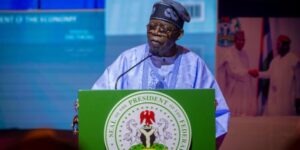
President Bola Ahmed Tinubu has announced that Nigeria’s newly finalized Carbon Market Activation Policy is poised to unlock up to $2.5 billion in high-integrity carbon credits and related investments by 2030, positioning Nigeria as a leading hub for climate-smart finance in Africa.
The President made this known on Wednesday through a statement by his Special Adviser on Information and Strategy, Bayo Onanuga, during a high-level virtual dialogue on climate and the just transition. The session was jointly hosted by UN Secretary-General António Guterres and Brazilian President Luiz Inácio Lula da Silva in preparation for COP30, which will be held in Brazil. The policy is underpinned by Nigeria’s ongoing commitment to revising its Nationally Determined Contributions (NDCs), with a full update expected by September 2025 in line with the UN Framework Convention on Climate Change (UNFCCC).
The dialogue convened leaders from 17 countries, representing climate-vulnerable nations and regional groups such as the African Union, ASEAN, and the Alliance of Small Island States, alongside key players like China and the European Union. The aim was to renew political momentum for global climate action ahead of the next major climate conference.
He highlighted Nigeria’s Energy Transition Plan (ETP) as a practical and data-driven strategy to achieve net-zero emissions by 2060. The ETP focuses on five critical sectors – power, cooking, transportation, oil and gas, and industry, and requires an estimated $410 billion in investments.
Tinubu added that the government is working to align regulatory frameworks, offer fiscal incentives, and restructure institutions to facilitate progress in expanding energy access, decarbonizing the economy, and enhancing competitiveness simultaneously.
He also highlighted Nigeria’s leadership role in the Mission 300 initiative, a collaboration with the World Bank and African Development Bank to electrify 300 million people across Africa by 2030.
In addition to regulatory reforms, Tinubu unveiled plans to create a Global Climate Change Investment Fund aimed at mobilizing both public and private financing, mitigating risks for green infrastructure projects, and fostering scalable clean energy innovations.
The fund will prioritize investments in:
- Regenerative agriculture initiatives
- Renewable energy mini-grids for underserved communities
- E-mobility infrastructure
- Green industrial hubs
This initiative complements Nigeria’s National Energy Compact, which outlines clear targets for expanding clean energy access and promoting clean cooking technologies.
President Tinubu also expressed gratitude to international partners, including the United Nations and Sustainable Energy for All (SEforALL), for their critical advisory and technical support in shaping Nigeria’s energy and climate policies.
